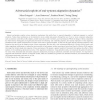Free Online Productivity Tools
i2Speak
i2Symbol
i2OCR
iTex2Img
iWeb2Print
iWeb2Shot
i2Type
iPdf2Split
iPdf2Merge
i2Bopomofo
i2Arabic
i2Style
i2Image
i2PDF
iLatex2Rtf
Sci2ools
138
Voted
JPDC
2007
2007
Adversarial exploits of end-systems adaptation dynamics
Internet end-systems employ various adaptation mechanisms that enable them to respond adequately to legitimate requests in overload situations. Today, these mechanisms are incorporated in most scalable end-systems through the use of one or more component subsystems such as admission controllers, traffic shapers, content transcoders, QoS Controllers, and load balancers. While the design of these components has been heavily investigated and significantly fine-tuned for efficiency and scalability purposes, the security implication of the adaptation mechanisms used in these components has not been on the radar to system designers. To that end, this paper exposes adversarial exploits of the dynamics that result from the adaptive nature of these components. We show that a well orchestrated Reduction of Quality (RoQ) attack could induce significant inefficiencies or reduce the service quality of end-systems, without resorting to brute-force Denial-of-Service (DoS) exploits that target ...
Related Content
| Added | 16 Dec 2010 |
| Updated | 16 Dec 2010 |
| Type | Journal |
| Year | 2007 |
| Where | JPDC |
| Authors | Mina Guirguis, Azer Bestavros, Ibrahim Matta, Yuting Zhang |
Comments (0)

